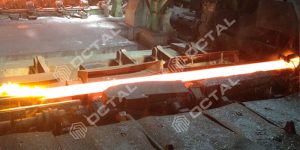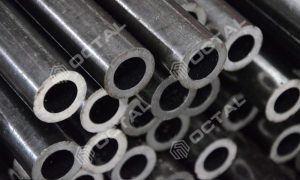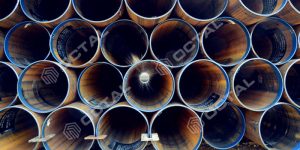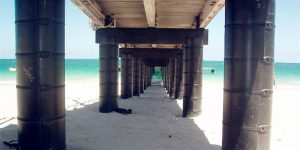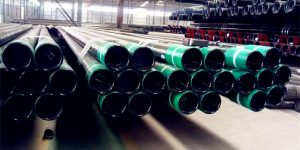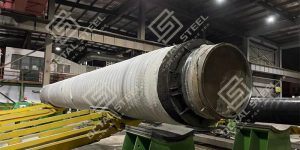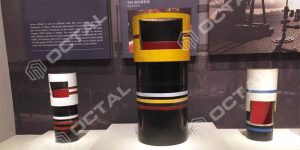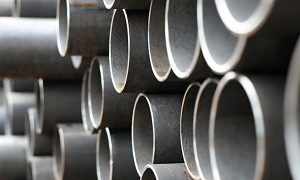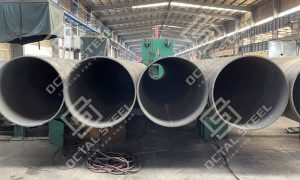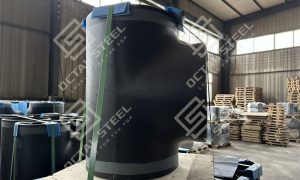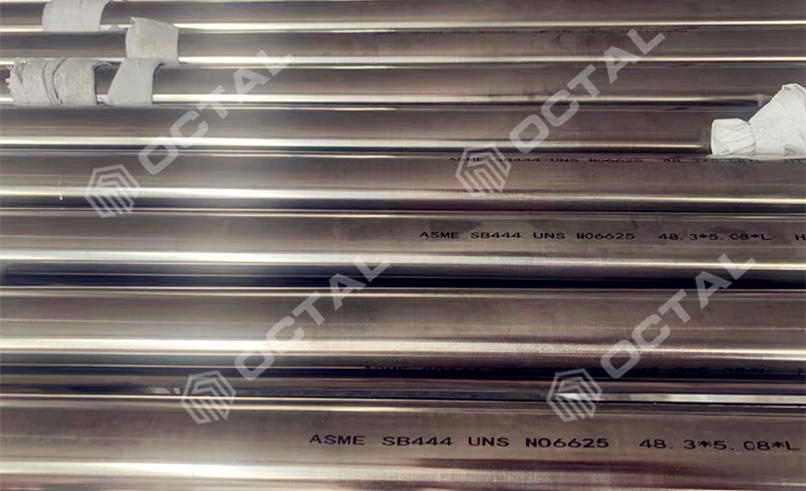Inconel 625 / Nickel Alloy 625 / UNS N06625 Pipe and Tube
Inconel 625 (ASTM B444 UNS N06625) Nickel-Chromimum-Molybdenum-Columbium Alloys (Nickel 58%)
Incoloy 825 (ASTM B424 N08825) Nickel-Iron-Chromium-Molybdenum-Copper Alloy (Nickel 38 to 46%)
Wall thickness: SCH 10, SCH 40, SCH STD, SCH 80, SCH XS, SCH 160
Length: 6 meters, 12 meters or customized.
CRA Lined or Clad Pipes with 625 or 825: Lined or clad with carbon steel pipe with mechanical bonding or weld overlay
Nickel alloy 625 is nickel-chromium-molybdenum-columbium alloy material, major content Nickel minimum 58%, also called Inconel 625 or UNS NO6625 under standard ASTM B444 for pipes, or ASTM B443 for plates coils. Other chemical content Chromimum 20% to 23%, Columbium + tantalum 3.15% to 4.15%, Molybdenum 8.0% to 10.0%, columbium Cobalt allow 1.0% max if determined, Iron 5.0% max.
Density of 8.4 g/cm3, melting point of 1290-1350 °C. It has excellent corrosion resistance to inorganic acids, and has excellent corrosion resistance to various corrosive media in oxidative and reducing environments.
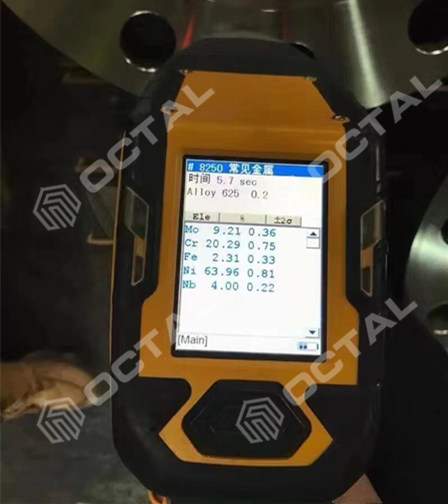
Inconel Alloy 625 / Inconel 625 / UNS N06625 Features
Inconel alloy 625 is a non-magnetic, corrosion and oxidation resistant, nickel-chromium based solid solution strengthened deformed superalloy.
A Solid solution strengthened nickel-based deformed superalloy with molybdenum and niobium as the main strengthening elements. The high strength of Inconel 625 is due to the hardened combination of molybdenum and niobium on the nickel-chromium matrix of the alloy. The addition of molybdenum acts with the niobium to stiffen the alloy matrix, providing a high strength without a strengthening heat treatment.
Inconel 625 is extremely resistant to a variety of unusually severe corrosive environments, including high temperature effects such as oxidation and carburization, including corrosion. Because of the solid solution of the refractory Co and Mo in a Nickel-Chromium matrix, provides 625 an outstanding strength and toughness in high temperature ranging from low up to 2000°F (1093°C).
Inconel 625 Clad Pipe Lined Pipe / Nickel Alloy 625 Weld Overlay
Inconel 625 material could be clad or lined on high strength carbon steel pipe like API 5L X60, X65, X70, it includes outer mother pipe carbon steel to provide strength, and inner material cladded or lined Inconel 625, to provide high corrosion resistance in various environments including marine, airspace, chemical plants and petrochemical industries.
Cladding or lining inconel alloy 625 material inside of the carbon steel pipe has been a popular option to solve the corrosive problems and save a lot of cost.
Inconel 625 Advantages
High tensile strength and high corrosion fatigue properties;
High resistance to oxidation at elevated temperatures up to 1050C.
Good processing and welding properties are good;
Excellent corrosion resistance and oxidation resistance;
Resistant to stress corrosion in a salt spray atmosphere;
Outstanding resistance to pitting, crevice corrosion and intercrystalline corrosion;
Excellent mechanical properties at both extremely low and extremely high temperatures;
Almost complete freedom from chloride induced stress corrosion cracking;
Good resistance to acids, such as nitric, phosphoric, sulfuric and hydrochloric, as well as to alkalis makes possible the construction of thin structural parts of high heat transfer.
Nickel alloy 625 / Inconel 625 / UNS N06625 has a very low corrosion rate in both marine and non-marine environments, has good seawater corrosion resistance, is resistant to corrosion by various salt solutions, has good corrosion resistance to HNO3 phosphoric acid, and is resistant to heating to the boiling point. The following HCl and low-concentration sulfuric acid are also quite resistant. The aging hardening phenomenon of the alloy after long-term use at 550-700 ℃ can lead to some decline in the plasticity of the N06625/No6625 alloy. And resistance to stress corrosion cracking against chloride ions – making it an excellent choice for seawater and aerospace applications.
Applications
Aerospace
Marine engineering
Nuclear reactors
Boiler Furnace
Engine parts
Components where exposure to sea water and high mechanical stresses are required.
Oil and gas production where hydrogen sulfide and elementary sulfur exist at temperature in excess of 150℃.
Components exposed to flue gas or in flue gas desulfurization plants.
Flare stacks on offshore oil platforms.
Hydrocarbon processing from tar-sand and oil-shale recovery projects.
Polution control equipment
Make inconel 625 clad pipe – CRA lined and clad pipes with carbon steel pipe by mechanical lined or weld overlay cladding process
Common used parts for this alloy are springs, seals, bellows for submersible controls, cable connectors, fasteners, flexures, and oceanographic instrument components. A wide variety of plates, bars, tubes, and forgings are available. Fabricability is typical for a nickel alloy, with the material readily formable and weldable by a variety of techniques.
Inconel Alloy 625 Chemical Composition:
Nickel 58% min
Chromium 20% to 23%
Molybdenum 8% to 10%
Iron 5.0% max
Carbon 0.10% max
Manganese 0.50% max
Silicon 0.50% max
Phosphorus 0.015% max
Sulfur 0.015% max
Aluminum 0.40% max
Titanium 0.40% max
Columbium + tantalum 3.15% to 4.15%
ASTM B444 UNS N06625 Pipe and Tube Standard Specification
UNS N06625 products are furnished in two grades depending on different heat treatment methods:
Grade 1 in annealed, material normally employed in service temperaures up to 1100℉ (593℃).
Grade 2 in solution annealed, normally employed in service temperature above 1100℉ (593℃) when resistance to creep and rupture is required.
Hot-working or reannealing may change properties significantly, depending on working history and temperature.
(Other alloy mateiral UNS N06219 and UNS N08825 are supplied in solution annealed condition only.)
Reference Documents
ASTM Standard
ASTM B829 Specification for general requirements for Nickel and Nickel Alloy Seamless Pipe and Tube
E112 Test methods for determining average grain size
G28 Test methods for detecting susceptibility to intergranular corrosion in wrought, Nickel-Rich, Chromium-Bearing Alloys.
G48 Test methods for pitting and crevice corrosion resistance of stainless steels and related alloys by use of Ferric Chloride Solution
Test referred
Chemical Composition – One test per lot.
Tensile Test – On test per lot.
Hydrostatic or Nodestructive Electric Test – Each piece in each lot.
Mechanical Strength for Nickel Alloy 625
For Alloy N06625 grade 1 with annealed heat treatment (Annealed ≥ 871℃/1600℉), tensile strength minimum 827 Mpa (120 ksi). Yield strength min 414 Mpa 60 ksi, Elongation minimum 30%.
For N06625 grade 2 with solution annealed, TS minimum 690 Mpa (100 ksi), YS minimum 276 Mpa (40ksi), Elongation minimum 30%.
Solution annealed at 2000℉ (1093℃) minimum, with or without subsequent stabilization anneal at 1800℉ (982℃) minimum to increase resistance to sensitization.
Inconel 625 VS Incoloy 825 (UNS N06625 VS UNS N08825)
Inconel 625 and Incoloy 825 are two most important nickel alloys used in oil and gas industry. The major difference between two materials is the nickel content value, for Inconel 625 Nickel 58% minimum, and for Incoloy 825 Nickel at range of 38% to 46%. And this makes the 625 material more expensive.
lncoloy 825 is an austenitic nickel-iron-chromium-molybdenum-copper alloy also containing high levels of chromium, nickel, copper and molybdenum that can provide high levels of corrosion resistance to both moderately oxidizing and moderately reducing environments.
This balance of alloying elements grants this alloy exceptional resistance to both chloride stress corrosion cracking, as well as crevice corrosion and general corrosion. Chloride stress corrosion cracking is a type of localised intergranular corrosion on materials that are put under tensile strength, in high temperatures and in an environment that includes oxygen and chloride ions such as seawater.
With high content of Nickel included with the percentage of molybdenum and copper in this nickel alloy produces substantially improved corrosion resistance in a corrosive environment such as reducing environments compared to stainless steel. Titanium added in Incoloy Alloy 825 also helps to stabilize the alloy against intergranular corrosion.
Chemical Content of Incoloy 825 (UNS N08825 under ASTM B424)
Nickel 38% to 46%
Chromium 19.5% to 23.5%
Iron 22.0% minimum
Carbon 0.05% max
Manganese 1.0% max
Copper 1.5% to 3.0%
Silicon 0.5% max
Sulfur 0.03% max
Aluminum 0.2% max
Titanjum 0.6% to 1.2%
Molybdenum 2.5% to 3.5%
Compared with alloy 625 material, alloy 825 has lower content of Nickel, but extra Titanjum and Copper.
Tensile strength 586 Mpa (85 ksi) min, yield strength 241 Mpa (35 ksi) min, Elongation 30% min.
Incoloy 825 (UNS N08825) is an austenitic, nickel alloy, the material is ductile over a wide range of temperatures from cryogenic to well in excess of 1000 °F (538 °C).
Our Supply Range For Nickel Alloy 625
Standard and Grades: ASTM B444 UNS N06625 / ASTM B424 N08825
625 Material types: Nickel-Chromimum-Molybdenum-Columbium Alloys
825 Material types: Nickel-Iron-Chromium-Molybdenum-Copper Alloy
Manufacturing types: Seamless hot rolled, anneald; Welded
Sizes: 1/2” to 16”
Wall thickness: SCH10, SCH 20, SCH 40, SCH STD, SCH 80, SCH XS, SCH 160
Length: 6 meters, 12 meters or customized.
CRA Lined or Clad Pipes with 625 or 825: Lined or clad with carbon steel pipe with mechanical bonding or weld overlay


